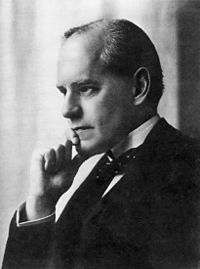John Galsworthy
| John Galsworthy | |
|---|---|
| Nascimento | 14 de agosto de 1867 Coombe, Surrey (hoje Londres) |
| Morte | 31 de janeiro de 1933 (65 anos) Londres |
| Nacionalidade | britânico |
| Prêmios | |
| Magnum opus | A família Forsyte |
| Campo(s) | escritor |
John Galsworthy (Coombe, Surrey, 14 de agosto de 1867 — Londres, 31 de janeiro de 1933) foi um novelista e dramaturgo Britânico. Sua obras mais notáveis incluem The Forsyte Saga (1906-1921) e suas sequelas, A Modern Comedy e End of the Chapter.
Ele ganhou o Prêmio Nobel de Literatura em 1932 devido à "sua distinta arte de narração que assume a sua forma mais elevada em Forsyte Saga[1]".
John Galsworthy nasceu em Kingston Hill, em Surrey, Reino Unido, numa família rica, como filho de John e Bailey Blanche (Bartleet née) Galsworthy.
Leitura selecionada[editar | editar código-fonte]
- From the Four Winds, 1897 (as John Sinjohn)
- Jocelyn, 1898 (as John Sinjohn)
- Villa Rubein, 1900 (as John Sinjohn)
- A Man of Devon, 1901 (as John Sinjohn)
- The Island Pharisees, 1904
- The Silver Box, 1906 (his first play)
- The Forsyte Saga, 1906–21, 1922
- The Man of Property, 1906
- (interlude) Indian Summer of a Forsyte, 1918
- In Chancery, 1920
- (interlude) Awakening, 1920
- To Let, 1921
- The Country House, 1907
- A Commentary, 1908
- Fraternity, 1909
- A Justification for the Censorship of Plays, 1909
- Strife, 1909
- Fraternity, 1909
- Joy, 1909
- Justice, 1910
- A Motley, 1910
- The Spirit of Punishment, 1910
- Horses in Mines, 1910
- The Patrician, 1911
- The Little Dream, 1911
- The Pigeon, 1912
- The Eldest Son, 1912
- Moods, Songs, and Doggerels, 1912
- For Love of Beasts, 1912
- The Inn of Tranquillity, 1912
- The Dark Flower, 1913
- The Fugitive, 1913
- The Mob, 1914
- The Freelands, 1915
- The Little Man, 1915
- A Bit's Love, 1915
- A Sheaf, 1916
- The Apple Tree, 1916
- Beyond, 1917
- Five Tales, 1918
- Saint's Progress, 1919
- Addresses in America, 1912
- The Foundations, 1920
- In Chancery, 1920
- Awakening, 1920
- The Skin Game, 1920
- To Let, 1920
- A Family Man, 1922
- The Little Man, 1922
- Loyalties, 1922
- Windows, 1922
- Captures, 1923
- Abracadabra, 1924
- The Forest, 1924
- Old English, 1924
- The Show, 1925
- Escape, 1926
- Verses New and Old, 1926
- Castles in Spain, 1927
- A Modern Comedy, 1924–1928, 1929
- The White Monkey, 1924
- (Interlude) A Silent Wooing, 1927
- The Silver Spoon, 1926
- (Interlude) Passers By, 1927
- Swan Song, 1928
- Two Forsyte Interludes, 1927
- The Manaton Edition, 1923–26 (collection, 30 vols.)
- Exiled, 1929
- The Roof, 1929
- On Forsyte 'Change, 1930
- Two Essays on Conrad, 1930
- Soames and the Flag, 1930
- The Creation of Character in Literature, 1931 (The Romanes Lecture for 1931).
- Maid in Waiting, 1931
- Forty Poems, 1932
- Flowering Wilderness, 1932
- Over the River, 1933
- Autobiographical Letters of Galsworthy: A Correspondence with Frank Harris, 1933
- The Grove Edition, 1927–34 (collection, 27 Vols.)
- Collected Poems, 1934
- End of the Chapter, 1931–1933, 1934 (posthumously)
- Maid in Waiting, 1931
- Flowering Wilderness, 1932
- One More River, 1933 (originally the English edition was called Over the River)
- Punch and Go, 1935
- The Life and Letters, 1935
- The Winter Garden, 1935
- Forsytes, Pendyces and Others, 1935
- Selected Short Stories, 1935
- Glimpses and Reflections, 1937
- Galsworthy's Letters to Leon Lion, 1968
- Letters from John Galsworthy 1900–1932, 1970
Bibliografia[editar | editar código-fonte]
- Jeffrey S. Reznick, 2009 John Galsworthy and Disabled Soldiers of the Great War Manchester University Press.
Referências
- ↑ «Facts on the Nobel Prize in Literature». www.nobelprize.org. Consultado em 8 de agosto de 2018
Ligações externas[editar | editar código-fonte]
- «Perfil no sítio oficial do Nobel de Literatura 1933» (em inglês)
- John Galsworthy (em inglês) no Find a Grave
| Precedido por Erik Axel Karlfeldt |
Nobel de Literatura 1932 |
Sucedido por Ivan Bunin |

